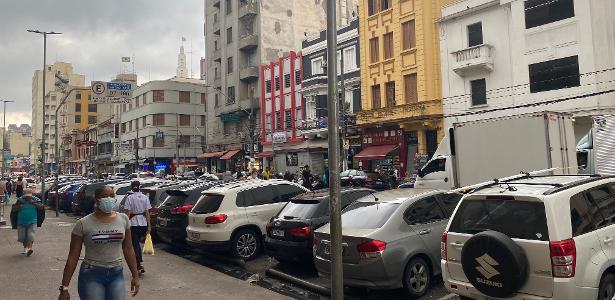Fruit scam and expensive parking
4 min read
The Municipal Market in São Paulo (Mercadao), which has been in the news recently because of the so-called fruit strike (maneuvering by some merchants to sell products at higher-than-normal prices), it has other problems reported by customers, such as expensive parking. With the concession granted to the private sector in April 2021, the price for parking that used to cost R$5 an hour is now five times higher: R$25 for the first hour.
Those who park on the street approach toe slippers that charge double the official rate for the Blue Zone (revolving street parking). The official price for the Digital Blue Card (CAD) is BRL 5.75 an hour, but the flannels charge $10.
25 BRL for the first hour and 5 BRL for the additional hour
It is one of the main tourist attractions in São Paulo market 300 places in her pockets. Part of the parking lot has been closed due to restoration work on the facade.
The system is now managed by a private company called G-Park. Passenger cars pay R$25 for the first hour and another $5 for the additional hour. That is, two hours on site cost R$30.
Motorcycles (15 BRL) and vans (50 BRL) have different prices for the first hour inside G-Park, but others leave for $5 as well.
Few vacancies and many flannels
Those arriving by car in Rua da Cantareira, in the center of São Paulo, are soon approached by several thieves, who negotiate vacancies around the tourist area. To stop on the street, the price is $10 for the first hour. After that, you are charged another R$5 per hour. In other words, the driver will pay R$15 to spend two hours with the car parked in the public space.
There are at least 70 official vacancies in the Blue Zone, which must be paid for through the application. According to Estapar, which operates the city’s digital system, one hour costs R$ 5.75 and two hours costs R$ 11.50.
Once the car arrives, the report notes, the flannel notes the license plate and time. Since the street is relatively small, it has a one-way street, and there are many flannels, the general atmosphere is kind of a compulsion to pay them directly. Cars parked irregularly outside the demarcated areas were also seen.
wanted by UOLCET reports that “the inspection of occupation of public spaces by third parties is not the responsibility of CET. The traffic agent does not have police authority.”
Regarding irregular parking, he said, “What is important is the paid parking in the digital application. [que não pagarem] subject to a fine.”
a UOL She contacted the civil police, who reported, in a note, that they had no record of complaints against flanlinhas in the area. The company also said it is implementing anti-theft and anti-theft measures in the vicinity of Mercado.
The military police stated that they “seek to prevent criminal acts in order to increase security and ensure freedom of movement and calm for citizens who use the area,” but did not comment specifically on the issue of overpricing public parking.
Private parking
Flannellen also directs cars to one of the area’s private car parks. There are at least eight around the Mercadão and on Rua da Cantareira.
At 415, two parking lots charge 20 R$ for the first hour and 20 R$ for the second hour. That’s 40 BRL for two hours.
At altitude number 353 the position distinguishes between small and large cars. Juniors pay 20 BRL and adults 25 BRL in the first hour. After that, 15 BRL per hour was added.
The price of private parking ends up being more expensive than the official car park, if the visit exceeds 2 hours. However, the driver may surprise the flannels by not realizing the difference in values, and fall into the scam.
Street surveillance
Estapar, the franchisor that operates Zona Azul in the city of São Paulo, says it provides mechanisms to support inspections in the Mercadão suburbs on a daily basis.
Vehicles equipped with automatic license plate recognition cameras, which video-monitor roads, as well as geolocation equipment (GPS).
All this provides an information center, which, online and in real time, checks whether the car’s license plate has a digital blue card active in the system or not, as well as the time of use.
Traffic Engineering Corporation (CET) states that inspections in the Zalzal area are carried out electronically by vehicles equipped with monitoring devices. The inspection tour is carried out at least every hour, depending on the traffic conditions on the road to be traveled.
CET also reports that in the first two months of 2022, 134 vehicles were fined in the Mercadão region for standing in disagreement with regulations.

“Entrepreneur. Music enthusiast. Lifelong communicator. General coffee aficionado. Internet scholar.”









